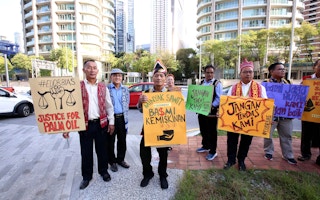Officials from Indonesia and Malaysia are currently locked in heated talks with their counterparts from the European Union (EU) over a law designed to stop deforestation-linked products from entering Europe.
The rule, known as the EU Deforestation Regulation (EUDR), was formally adopted by the regional bloc on 16 May 2023. Producers of forest-risk products such as palm oil, rubber, cocoa, coffee, soya, timber and cattle are waiting for implementation guidelines and have until late-2024 to comply.
Southeast Asian policymakers worry that the law will hurt trade for palm oil, of which Indonesia and Malaysia are the biggest producers. The most widely used edible oil has been responsible for extensive loss of forest and wildlife in tropical grower countries, but lobbyists including Indonesia’s prime minister Joko Widodo, argue that the industry has dramatically improved its deforestation track record and should be allowed to access European supply chains.
The palm oil lobby also contends that the EUDR’s rules will make it difficult for smallholder farmers to comply. To sell into the EU, businesses must provide maps and satellite data to prove exactly where their crops were grown. Smallholders, who produce roughly 40 per cent of Malaysia and Indonesia’s palm output, are at risk of being removed from supplier lists – a similar fate seen following an iconic confectionary brand that declared itself “deforestation-free” in 2020.
Speaking at an Eco-Business event in June 2023, Megan Willis, head of sustainable sourcing at consumer goods company Unilever, said her company – which is the world’s biggest buyer of oil palm – welcomed the EU’s move to address deforestation, but warned of the transition risk embedded in the law. “We don’t want to leave out smallholders and we also don’t want to create a leakage market. Not all boats rise with the tide,” she said.
The leakage market refers to countries and companies with lower environmental standards that will buy oil palm regardless of how and where it was grown. The EU imports about 3.5 million tonnes of oil palm worth €2.2 billion a year – small compared to India, the world’s biggest oil palm importer, which buys 4.5 times that of the EU in terms of import value, and without conditions that penalise deforestation-linked commodities.
Another complaint volleyed against the EUDR is that it does not consider any certification scheme, including the Roundtable on Sustainable Palm Oil (RSPO), as a proxy for deforestation-free. The RSPO has tightened its standards in recent years and emerged as the strongest of the forest-risk certification schemes in a 2021 study by environmental campaign group Greenpeace.
Europe is by far the world’s largest consumer of sustainable palm oil, accounting for 45 per cent of total global use of RSPO-certified oil. But only one-fifth of the global palm oil trade is RSPO-certified, a proportion that has not grown since 2014, mainly due to low demand from India and China. While the two nations are the biggest importers of palm oil globally, a mere 4 per cent and 3 per cent of their imported palm oil is RSPO-certified, respectively.
The RSPO has long received criticism for failing to police members who have broken RSPO standards. A 2020 study found that some RSPO-certified palm oil concessions led to the deforestation of biodiverse tropical forests in Indonesia and Malaysia over the last few decades. Despite this, Chris Humphrey, executive director of the EU-Asean Business Council, has called on the EU to accept RSPO as the basis for allowing palm oil exports from Indonesia and Malaysia.
The smallholder dilemma
Not everyone believes that the EUDR will marginalise smallholders. If smallholders are provided with “targeted support” by the public and private sectors to supply farm-level traceability to commodity buyers, these farmers will be in a stronger competitive position to sell their crops into global value chains, argues environmental group Mighty Earth.
“That means the EU, working alongside public and private sector actors, offering practical measures and on-the-ground engagement with farmers so they meet all the compliance requirements before the EUDR comes into force in late 2024,” Amanda Hurowitz, senior director, Asia, Mighty Earth, told Eco-Business.
One of Indonesia’s smallholder unions holds a similar view. Serikat Petani Kelapa Sawit (SPKS), an Indonesian palm oil farmers union, has played down the objections of Malaysian and Indonesian officials to the EUDR as “excessive” and welcomed the proposed financial and technical compliance support, as well as a living wage for farmers that the law pushes for.
Helping smallholders work towards fulfilling EUDR requirements will not be prohibitively costly for big palm oil companies. A study by non-profit Chain Reaction Research (CRR) found that supporting smallholders with traceability efforts could cost up to 3.5 per cent of company revenues. The study also suggests that helping smallholders with EUDR compliance would protect an estimated US$14.3 billion in reputational value.
Gerard Rijk, a Netherlands-based equity analyst at Profundo, one of the co-creators of CRR, noted that smallholders contracted to work for big palm oil companies, known as “plasma” smallholders, will find compliance easier than independent smallholders, who are often blamed for deforestation and starting fires to clear land as they lack the means to grow palm oil sustainably.
“Independent smallholders face increasing problems gaining access to sustainable markets. Infrastructure needs to be built around independent smallholders to avoid further deforestation,” Rijk said. An example of this is granting smallholders access to low-interest loans that enable them to replace ageing, unproductive trees without the need to clear more forest to plant new trees.
“Smallholders cut down trees because they have no choice. There needs to be a programme that supports them in bridging the gap in cash flow decline as their trees age and yield falls,” he told Eco-Business.
One palm oil company that has invested in helping farmers transition to sustainable methods is Indonesia’s Musim Mas, which sources 40 per cent of its fresh fruit bunches from independent smallholders and trains thousands in sustainable cultivation. Olivier Tichit, Musim Mas’ director of sustainable supply chain, said the company’s capacity-building programme is “not about being nice to smallholders”, but rather “a matter of extreme self-interest.”
Smallholders that grow palm oil sustainably are more productive and earn more, while the industry gets more volume without having to expand further, Tichit noted.
“We need to give smallholders access to technology and knowhow and better integrate them into the formal economy – that way they will be more compliant with the law [and less likely to cut trees],” he said.
“We need to recognise smallholders as a key part of the ecosystem – not just as producers, but as people with their own decisions to make. They have to feel part of the greater market and understand that consumers care about how they work [in driving sustainable palm production],” he said.
Tichit added that some smallholders may have reservations about sharing data to meet EUDR requirements. “Farmers not only have to share their data with their immediate buyers, but also with someone sitting in Brussels. It’s an unbalanced relationship,” he said, referring to the capital city of Belgium, which is one of the 27 member states of the EU.
Musim Mas has had to make tough decisions about who among its smallholder suppliers can feed into the EU system, and who can’t, he said.
The EUDR, Tichit argues, contradicts one key pillar of the European Green Deal, a set of proposals unveiled in 2019 to make the EU’s climate, energy and transport policies fit for cutting greenhouse gas to net zero by 2050. One of the three core principles of the deal is “no person and no place left behind.” “The EU is missing that target with the EUDR,” Tichit said.
Tichit hopes that Southeast Asian policymakers will emphasise the importance of smallholder inclusion in their negotiations with their European counterparts. “The implementation guidelines [which have yet to be released by the EU] are essential to see how inclusive the regulations are,” Tichit noted.
He added that palm oil-related deforestation, however, has been slashed – forest conversion for oil palm in Indonesia, Malaysia and Papua New Guinea fell in 2021 to its lowest level since 2017, according to analysis by CRR – mainly through engagement with the palm supply chain, not from punitive legislation.
“The EU is pushing fast and hard [with regulation]. It’s not supportive of engagement. Palm-linked deforestation has been reduced, and engagement was a big part of that,” Tichit said, but noted that “this regulation is not helping to drive further improvements in forest loss through the value chain.”
“Indonesia has made great strides in reducing deforestation from the palm oil sector. The EUDR was a missed opportunity to expand that good work to other commodities,” he said.











